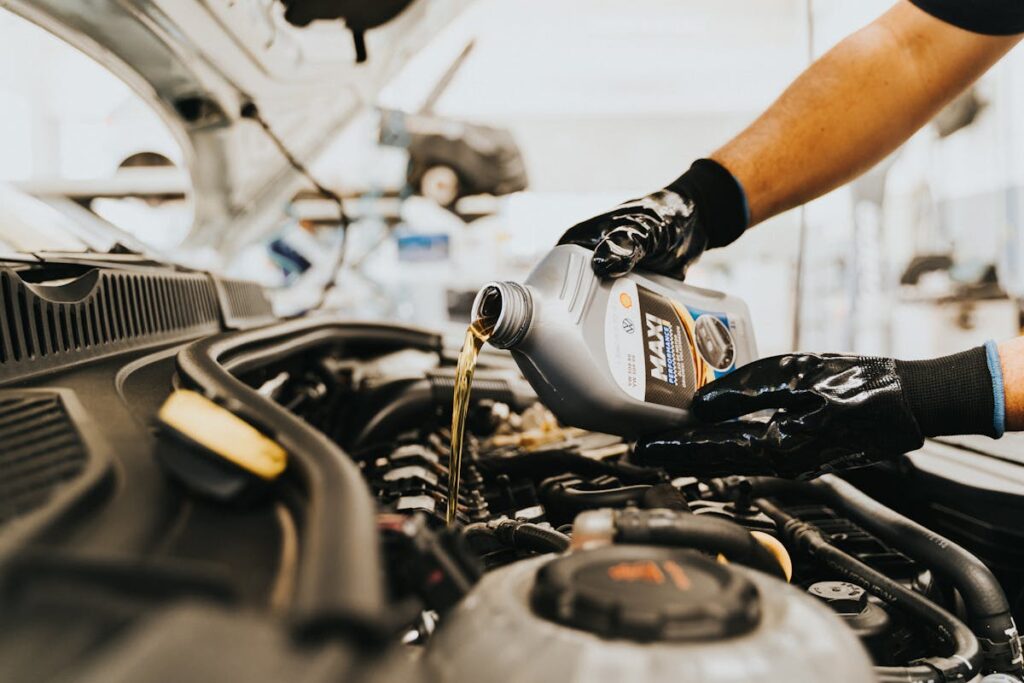In the domain of automotive maintenance, the type of oil used in older cars is a subject of considerable debate and importance. The correct selection could drastically improve the performance and longevity of the vehicle, whilst an incorrect choice could potentially lead to premature engine wear or even failure. The options range from high-mileage oil, synthetic oil, conventional oil, to semi-synthetic oil, each with its own set of benefits and drawbacks. To form a well-informed decision on this matter, one must explore the nuances of these oil types and their interaction with aging engines.
Understanding Your Car’s Oil Needs
Why should one consider the specific oil needs of their aging vehicle? As cars age, their engines undergo a variety of changes, making them more susceptible to particular types of engine wear. Understanding the nuances of different oil types becomes essential to mitigating these changes and prolonging the life of the vehicle. Conventional oil may have served your engine well in its early years, but as mileage accumulates, the lubrication properties and viscosity stability of such oil may become insufficient. Synthetic oils, for instance, offer superior thermal stability, reducing engine wear considerably. As a result, being informed about your car’s specific oil needs and the technical characteristics of different oil types is a key aspect of responsible vehicle maintenance.
Benefits of High-Mileage Oil
Given the natural wear and tear that older cars experience, high-mileage oil offers a range of benefits that specifically cater to the needs of aged engines. It is specifically formulated to improve oil performance in vehicles with over 75,000 miles on the odometer. High-mileage oil contains additives that help reduce oil burn-off, leading to fewer emissions and improved fuel efficiency. It also has seal conditioners that reduce leaks, a common issue in older cars. Additionally, high-mileage oil helps in reducing engine sludge and deposits, extending the lifespan of your vehicle. Consequently, the high mileage benefits of this type of oil make it an ideal choice for maintaining and enhancing the performance of older cars.
Synthetic Versus Conventional Oil
The debate between synthetic and conventional oil is a nuanced one, requiring a thorough understanding of the properties and benefits of each. Synthetic oil, a product of advanced refining processes, offers superior protection and performance under extreme conditions. Conversely, conventional oil, while less advanced, has its merits, which primarily center around cost-effectiveness and suitability for less demanding engines.
Understanding Synthetic Oil
While many car owners may consider conventional oil as their go-to option, understanding the properties of synthetic oil is essential, especially when dealing with older models. Synthetic oil, engineered from pure, base chemicals, offers distinct advantages but also presents unique drawbacks.
- Synthetic oil advantages include superior lubrication, higher performance in extreme temperatures, and longer oil life, reducing the frequency of oil changes.
- On the other hand, synthetic oil drawbacks encompass a higher price point and potential compatibility issues with older car seals, possibly leading to oil leaks.
It is clear that synthetic oil is a complex product, with its own set of benefits and challenges. Consequently, it is pivotal for car owners to comprehend these factors before making an informed decision about the most suitable oil for their older vehicles.
Benefits of Conventional Oil
Undeniably, conventional oil holds a significant place in the heart of many car enthusiasts, particularly those with older models. One of the conventional oil advantages is that it provides an excellent balance between lubrication and friction reduction. This has direct implications for engine performance benefits, such as better fuel economy and longer engine life. Conventional oil’s higher viscosity index promotes better sealing and can prevent oil leakage, a common issue in older vehicles. Furthermore, it offers superior compatibility with older engine designs due to its formulation. Finally, conventional oil is more affordable, translating into cost savings for car owners. Consequently, those seeking performance and longevity from their older vehicles should consider the benefits of conventional oil.

The Role of Viscosity in Engine Oil
Understanding the viscosity of engine oil plays an essential role in maintaining and extending the life of older cars. The viscosity index directly influences oil stability, which in turn impacts engine performance and longevity.
- Viscosity determines the oil’s flow characteristics at different temperatures.
- The viscosity index measures the oil’s stability during temperature fluctuations.
- A higher viscosity index indicates greater oil stability, providing consistent lubrication to the engine.
- The right viscosity can reduce engine wear and tear, particularly in older models.
- Inadequate viscosity can lead to oil breakdown, causing potential engine damage.
Therefore, understanding and choosing oil with the appropriate viscosity is vital for car owners aiming to preserve and prolong the function of their vehicles, particularly older models.
Top Recommended Oils for Older Cars
Having elaborated on the importance of viscosity in engine oil, particularly for older vehicles, it’s crucial to turn our attention towards specific oil products that are highly recommended for such cars. High-mileage oils, such as Valvoline MaxLife High Mileage Motor Oil and Mobil 1 High Mileage Advanced Full Synthetic Oil, are specifically formulated for vehicles that have over 75,000 miles. These oils contain seal conditioners and additives that help to reduce leaks, combat sludge, and enhance overall engine performance. However, oil compatibility issues may arise when switching oil types, warranting careful consideration. It’s crucial to consult your vehicle’s manual or a professional mechanic before making a decision. High-mileage oils provide undeniable benefits, but compatibility should not be overlooked.
Changing Oil in Older Vehicles: Tips and Tricks
Moving forward in our exploration of oil for older vehicles, we’ll shift our focus to the intricacies of changing oil in these models. This will entail a thorough examination of oil viscosity, a comparison between synthetic and conventional oils, and the benefits of maintaining a regular oil change schedule. In doing so, we will provide valuable insights to guarantee the longevity and peak performance of your vintage vehicle.
Understanding Oil Viscosity
While it may seem complicated, oil viscosity is an integral aspect to evaluate when changing oil in older vehicles. Simply put, viscosity refers to the thickness or thinness of the oil. It’s a measure of the oil’s resistance to flow or, in layman’s terms, its ‘gooeyness’.
- Viscosity ratings, usually given as a number followed by a ‘W’, indicate the oil’s viscosity at different temperatures.
- High viscosity oils (thick oils) are better for hot conditions as they won’t thin out too easily.
- Conversely, low viscosity oils (thin oils) are ideal for cold conditions as they won’t thicken up.
- Older engines often benefit from higher viscosity oils due to wear and tear.
- Understanding oil thickness and viscosity ratings helps in making an informed choice for your vehicle.
Synthetic Vs Conventional Oil
What factors should you consider when choosing between synthetic and conventional oil for your older vehicle? The synthetic advantages are significant; this type of oil provides superior lubrication, reducing friction and wear, thereby enhancing engine performance and durability. Furthermore, synthetic oil operates efficiently in extreme temperatures, resisting thickening in cold conditions and thinning in heat. However, it’s more expensive than conventional oil. Conventional oil, while cheaper, has certain drawbacks. It tends to break down faster, requiring more frequent changes, and may not protect the engine as effectively against wear and tear. Additionally, it doesn’t perform as well in extreme temperatures. Consequently, while both options have merits, the choice largely depends on your vehicle’s specific needs, your driving habits, and your budget.
Regular Oil Change Benefits
Having considered the different aspects of synthetic and conventional oil for older vehicles, it is equally important to understand the benefits of regular oil changes. Regular maintenance, including consistent oil change frequency, is essential for the longevity and efficiency of any vehicle, especially older models.
The key benefits include:
- Enhanced engine performance: Consistent oil changes replenish additives and maintain peak engine functionality.
- Reduced engine wear: Fresh oil minimizes friction, reducing wear and tear.
- Improved fuel efficiency: Clean oil improves fuel consumption rates.
- Extended vehicle life: Regular maintenance, such as oil changes, can prolong the life of your vehicle.
- Oil filter importance: A new oil filter will guarantee harmful contaminants are removed efficiently.
Through understanding these points, the significance of regular oil changes for older vehicles becomes clear.
How Often Should You Change Oil?
Ever wondered how often you should change the oil in your older car? The oil change frequency is a pivotal aspect of your car’s maintenance schedule. Generally, mechanics recommend changing the oil every 3,000 miles or every three months, whichever comes first. However, for older vehicles, this change might need to occur more frequently due to the wear and tear of internal components. The oil’s job is to lubricate these parts, but over time, it breaks down and becomes less effective. Regular changes guarantee that your car’s engine components stay well-lubricated and free of dirt and sludge. Adhering to a diligent oil change frequency can prolong the life of your vehicle and maintain its performance.
Potential Risks of Using Wrong Oil
The misuse of motor oil can lead to significant issues in older vehicles. Oil degradation and engine wear are two such potential problems. Inappropriate oil choice accelerates oil degradation, causing it to lose its lubricating properties. This increases friction between engine components, leading to engine wear. Additionally, wrong oil can lead to:
- Excessive engine heating, causing a breakdown
- Decreased fuel efficiency, increasing running costs
- Premature engine failure, leading to expensive repairs
- Metal-on-metal contact, causing irreparable damage
- Poor cold-weather start, risking engine life
Frequently Asked Questions
Can Using Different Oil Brands Affect My Cars Performance?
Yes, different oil brands can impact your car’s performance. Oil viscosity and brand formulation are significant factors, as they directly influence engine lubrication, fuel efficiency, and overall vehicle longevity. Always consider these elements when choosing oil.
Are There Specific Oils for Different Car Brands or Models?
Yes, specific oils are often recommended based on car brands and models. These brand specifications and model recommendations are usually provided by the manufacturers to guarantee ideal engine performance and longevity of the vehicle.
Does the Climate or Weather Affect the Type of Oil I Should Use?
Yes, climate greatly affects oil choice. In colder climates, lower viscosity oil is recommended due to temperature fluctuations. Conversely, in warmer climates, higher viscosity oil is suitable to guarantee ideal engine lubrication and performance.
Can I Mix Synthetic and Conventional Oil in My Older Car?
Mixing synthetic and conventional oil is technically possible but not recommended. Inconsistencies in oil compatibility may affect engine longevity. It’s best to stick with one type for consistent performance and ideal engine health.
What Are the Signs of Using the Wrong Oil in My Vehicle?
Signs of using incorrect oil include increased engine noise and performance issues. These may be due to inappropriate oil viscosity, causing inadequate lubrication, increased friction, and potentially leading to significant engine damage over time.

